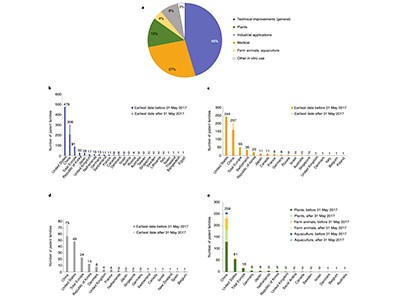This week, Wageningen University and Research in the Netherlands announced that it will allow non-profit organizations to use its CRISPR–Cas9 gene-editing technology for free, for non-commercial applications in food and agriculture. It’s an important development, and another step towards making a technology with untapped potential more accessible — especially for researchers in low- and middle-income countries.
Wageningen is one of a clutch of research institutions globally that hold patents on CRISPR, a technique that enables precise changes to be made to genomes, at specific locations. Other institutions — including the Broad Institute in Cambridge, Massachusetts, and the University of California, Berkeley, which have some of the largest portfolios of patents on the subject — also provide CRISPR tools and some intellectual property (IP) for free for non-profit use. But universities could do better to facilitate access to CRISPR technologies for research.
The field is snowballing. The US Patent and Trademark Office alone has around 6,000 CRISPR patents or patent applications, with 200 being added every month, mostly from China and the United States.
But unusually, universities and publicly funded research organizations dominate the CRISPR patenting landscape. As of 2017, only one-third of CRISPR patents came from the private sector, according to an analysis by Agnès Ricroch, a plant geneticist at the institute AgroParisTech, and her colleagues (J. Martin-Laffon et al. Nature Biotechnol. 37, 613–620; 2019). That means universities are in a strong position to influence change. And change begins with the licensing agreement — which is needed even when an organization is using IP for research.
Licensing agreements should be transparent, so that institutions offering access can be held accountable for the promises they make. But few publish these agreements, out of concern that it would give their competitors an advantage. However, if universities all agreed not to charge for IP used in research, they would no longer be in competition, and could collaborate to create model agreements.
Licensing agreements should also limit ‘reach-through clauses’. These allow patent holders to claim rights on commercialization of discoveries and inventions based on their IP, many years into the future. It’s a method of prolonging income, but has been likened to authors paying royalties to Google or Microsoft if they write a book on the companies’ word-processing software.
For centuries, patents have helped to protect inventors’ IP from competitors who would otherwise be able to copy and profit from someone else’s idea. Patents also incentivize the investment needed to develop or commercialize an idea, because they reassure investors that a technology cannot easily be copied.
But companies have been known to use patents to hinder competition. Moreover, when inappropriately applied, patents can be harmful. During a pandemic, for example, patents on vaccines could slow or reduce vaccine availability. That is why more than 100 countries, and many organizations (including Nature) are calling on members of the World Trade Organization to temporarily waive IP protection on COVID-19 vaccines.
Equitable access is crucial. Nearly two decades ago, international donors created the African Agricultural Technology Foundation in Nairobi as a platform to share know-how, tools and technology. Ecologist Gordon Conway, then president of the Rockefeller Foundation in New York City, promised it would “unjam the logjam” of IP in agricultural technology. In practice, concerns over genetic modification put the brakes on such technologies in low- and middle-income countries. But CRISPR is changing that, and universities that benefit from patents could help to establish an organization to facilitate access.
Two years ago, the Netherlands Federation of University Medical Centres proposed ten principles for “socially responsible licensing”. High on the list is that academic institutions should ensure that their research benefits societies, including allowing findings to be used freely for research or education.
It is fitting that a Dutch university is among those applying these principles for a technology that has world-changing potential. The time has come for all universities that hold CRISPR patents, along with public funders and international institutions such as the World Intellectual Property Organization, to consider how they might join forces so that IP on CRISPR can be more easily accessed free of charge for research, under clear and transparent rules.
"share" - Google News
September 07, 2021 at 08:40PM
https://ift.tt/2YDQhrn
License CRISPR patents for free to share gene editing globally - Nature.com
"share" - Google News
https://ift.tt/2VXQsKd
https://ift.tt/3d2Wjnc
Bagikan Berita Ini

















0 Response to "License CRISPR patents for free to share gene editing globally - Nature.com"
Post a Comment